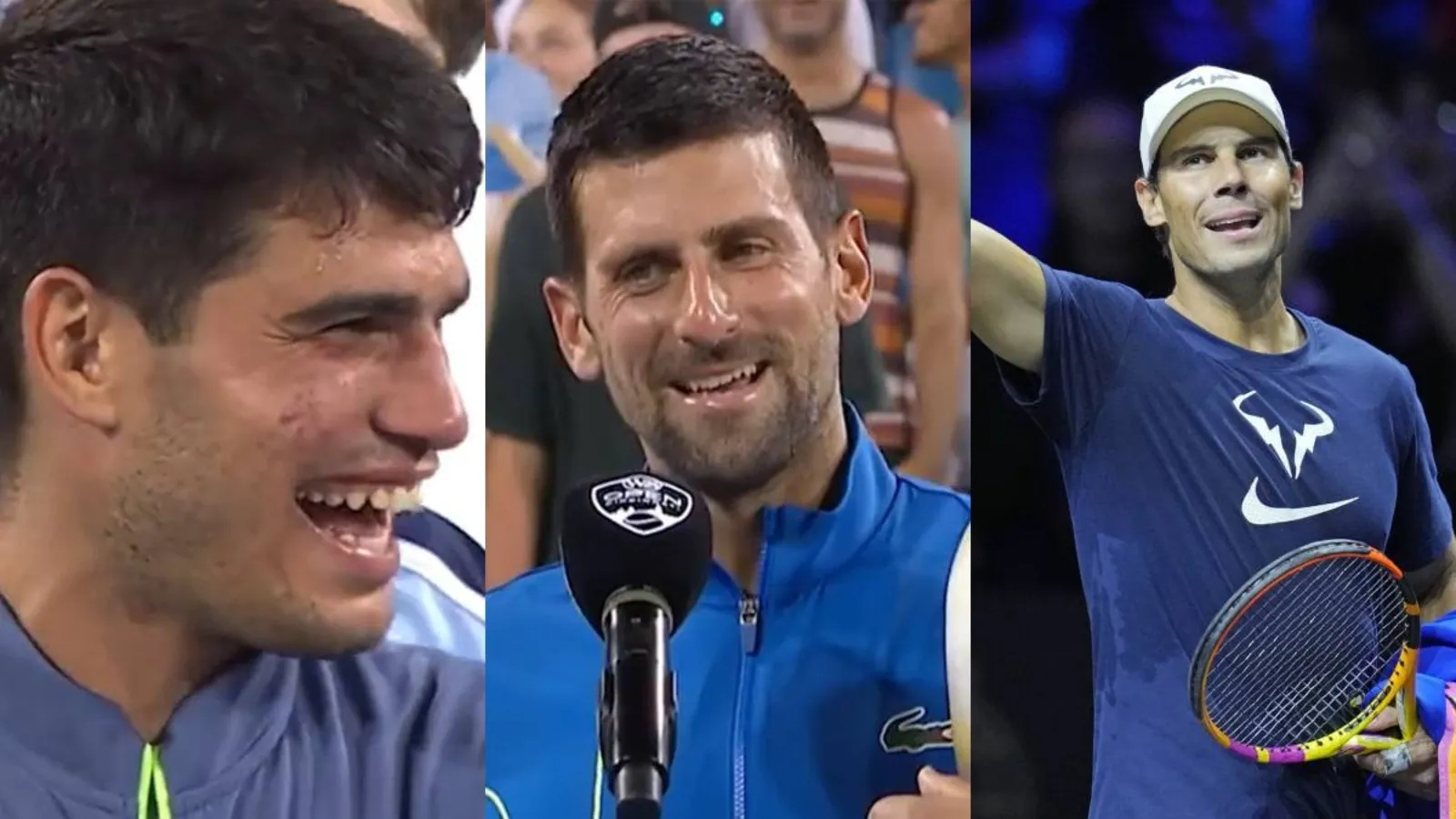
Rafael Nadal may have some valuable advice for Carlos Alcaraz following the young tennis star’s emotional outburst in Cincinnati, where the reigning Wimbledon champion lost his cool and smashed his racket.
This incident, which occurred during Alcaraz’s surprising second-round defeat to Gael Monfils at the Cincinnati Masters, stands in stark contrast to Nadal’s own composed demeanor on the court—a demeanor shaped by a mindset instilled in him from a young age.
A Legacy of Composure: Nadal’s Unbroken Record
Throughout his illustrious career, Nadal has featured in 30 Grand Slam finals, emerging victorious in 22 of them. Yet, despite the immense pressure of such high-stakes matches, the Spanish maestro has always managed to maintain his composure. His ability to remain calm under pressure has become one of his defining traits, earning him not only numerous titles but also the respect of fans and fellow players alike.
In an interview with CBS’ 60 Minutes in 2019, Nadal was asked how many rackets he had broken during his career. With a smile, he formed a zero with his finger and thumb, proudly indicating that he had never succumbed to the urge to destroy his equipment in a fit of frustration. He elaborated on this, explaining, “My family, they wouldn’t have allowed me to break a racket. For me, breaking a racket means I’m not in control of my emotions.”
This philosophy, deeply rooted in Nadal’s upbringing, has undoubtedly contributed to his long-term success. By refusing to let his emotions get the better of him, Nadal has consistently been able to focus on the task at hand, even in the most stressful situations. His approach serves as a reminder that mental discipline is just as important as physical skill in the world of professional tennis.
Alcaraz’s Cincinnati Outburst: A Learning Moment
In contrast, Carlos Alcaraz, who has quickly risen to the top of the tennis world, experienced a rare lapse in emotional control during his match against Gael Monfils. After failing to convert a break point in the third set, the usually composed Alcaraz let his frustration boil over, smashing his racket multiple times on the court. This uncharacteristic outburst earned him a code violation from the umpire and ultimately seemed to contribute to his defeat, as Monfils rallied to win the match 4-6, 7-6, 6-4.
After the match, Alcaraz spoke candidly about his actions, acknowledging that he had let his emotions get the best of him. “I felt sometimes that I wanted to break the racket. It never happened before because I could control myself in those situations, in those feelings,” he explained. “Most of the time I could control myself and it could go better in the matches or in the situation that I’ve been feeling before. Today I couldn’t control myself because, as I said, I was feeling that I was not playing any kind of tennis.”
Alcaraz’s honesty about his struggles with emotional control is commendable. It highlights the intense pressure that top athletes face, especially when things are not going their way. His outburst, while uncharacteristic, is not entirely uncommon in the sport. Many great players have had moments of frustration on the court, but what separates the best from the rest is how they learn and grow from these experiences.
The Importance of Emotional Control in Tennis
Tennis is often described as a mental game, where the psychological battles can be just as fierce as the physical ones. Players are not only competing against their opponents but also against their own thoughts and emotions. The ability to stay calm and focused, especially in critical moments, can be the difference between winning and losing.
Nadal’s approach to emotional control, which has been a hallmark of his career, could serve as a valuable lesson for Alcaraz. The 22-time Grand Slam champion’s refusal to break a racket is not just about respecting his equipment; it’s about maintaining a mindset that allows him to stay in control of the match, no matter how difficult the situation becomes.
For Alcaraz, this incident could be a turning point in his career. A moment where he learns to channel his frustration in more constructive ways, much like Nadal has done throughout his career. The young Spaniard’s talent is undeniable, and with the right mindset, he has the potential to dominate the sport for years to come.
Alcaraz’s Apology and Path Forward
Recognizing the impact of his actions, Alcaraz took to Instagram to issue an apology for his behavior, demonstrating his awareness of the importance of sportsmanship. “I want to apologise for my attitude yesterday, it was not good and that should not happen on court,” he wrote. “I’m human, the nerves had accumulated and sometimes it is very tough to control when there is that tension. I will work so that it doesn’t happen again.”
Alcaraz’s willingness to apologize and his commitment to improving his emotional control are promising signs for his future. By acknowledging his mistake and vowing to learn from it, he is taking the necessary steps to grow not only as a player but also as a person.
Nadal’s Potential Advice for Alcaraz
Given Nadal’s experience and the close bond he shares with Alcaraz, the veteran may have some words of wisdom for his younger compatriot. As they prepare to team up for the Paris Olympics, Nadal could share insights on how to manage emotions in high-pressure situations. His example of unwavering composure, even in the face of adversity, could serve as a valuable blueprint for Alcaraz as he continues to navigate the challenges of professional tennis.
In the end, moments like these are part of the journey for any athlete. How they respond and adapt determines their future success. For Alcaraz, the Cincinnati Masters may be a small setback, but with the right mindset and guidance from someone like Nadal, it could also be a crucial learning experience that helps him achieve even greater heights in his career.
Leave a Reply